Building a responsible tech canon
In the struggle for a more just and humane technological future, words can expose the power structures that shape our tools, tell the stories from especially marginalized groups, and spark imaginations that dare to dream beyond the status quo.
(m)otherboard is creating a canon—not in the exclusionary sense of a fixed list of “approved” texts handed down by gatekeepers—but in the sense of a living, breathing library of ideas, in a more welcoming, inclusive manner. This is a canon for the resistance: a curated, ever-evolving collection of books and ideas that give us frameworks for solidarity, and visions for technology that lead us to a more just and humane present and future.

Why canon?
We’re looking for works that remind us of our past, make sense of our present, and paint pictures of possible futures. It’s a canon that also centers perspectives that are often overlooked by the dominant culture, made by thinkers who interrogate power, storytellers who help us remember and dream, and the seers among us who are practiced at capturing their visions.
What we’ve chosen so far
Our first two entries set the tone for what’s to come:
- We Just Build Hammers: Stories from the Past, Present and Future of Responsible Tech by Coraline Ada Ehmke From H.G. Wells predicting the atomic bomb to Edmund Berkeley fighting for ethical computing in the 1950s, to Samuel Delany’s groundbreaking science fiction as a forerunner of the tech justice movement, Coraline’s riveting and accessible historical narrative reveals how speculative fiction has repeatedly shaped technological reality—and how today’s tech pioneers are repeating the same ethical struggles their predecessors faced.
- Imagination; A Manifesto by Ruha Benjamin Dr. Benjamin provides us with a proclamation of the power of the imagination. Her book is an invitation to rid our mental and social structures from the tyranny of dominant imaginaries, and a field guide for seeding an imagination grounded in solidarity and interdependence.
What makes the (m)otherboard canon?
Some themes have emerged from our book club curations thus far:
- Intersection of tech and humanity: How does technology shape—and how is it shaped by—society, culture, storytelling, and identity?
- Marginalized voices: We prioritize authors whose perspectives have been historically sidelined or stifled, and favor voices that reflect multicultural, intersectional, and intergenerational perspectives.
- Radical imagination: How can we envision fundamentally different futures, and not just reform broken, existing systems?
- Actionable insight:What inspiration and strategic organizing do we need to corral collective action to build better futures?
What books do you want to read together next, and why?
What’s next in our ‘to be read’ pile?
In the months ahead, our canon will grow to include:
- Worlds Within Us: Wisdom and Resilience of Indigenous Women Elders edited by Katsi Cook, José Barreiro and Randi Barreiro
Through the voices of eight Native women elders we’ll explore and uplift how Indigenous ancestral knowledge can support us in these times. Each narrative offers a door to a better future by remembering common values, common problems, and above all the common desire to assist in the transformation of others through the example of their own extraordinary lives. Last fall, (m)otherboard was honored to co-produce and support an intimate conversation between the author, Mohawk matriarch, midwife and activist Katsi Cook and legendary journalist Krista Tippett of On Being. Enjoy this life-changing conversation, “Women are the First Environment” in preparation for our book club. - Blockchain Chicken Farm: And Other Stories of Tech in China’s Countryside by Xiaowei Wang
This book explores the political and social entanglements of technology within rural China and challenges the perception of its people as "backward, conservative, and intolerant," showcasing their adaptation to globalization and innovation in technology.
What it means for the future
Our canon supports that the future is collectively imagined, and our intention is to open the conversation wider—as wide as it can go. Together, these books provide a map of how we got here and a compass to help lead the way forward.
In gathering these works, we are not just preserving knowledge—we are building a cultural infrastructure for the tech we want to see: tech that serves life, and bends the arc of technology from individualistic convenience to collective good!
We’d love to hear from you, dear readers. What are some of the books that you’d include in this canon?
— The God(m)others
